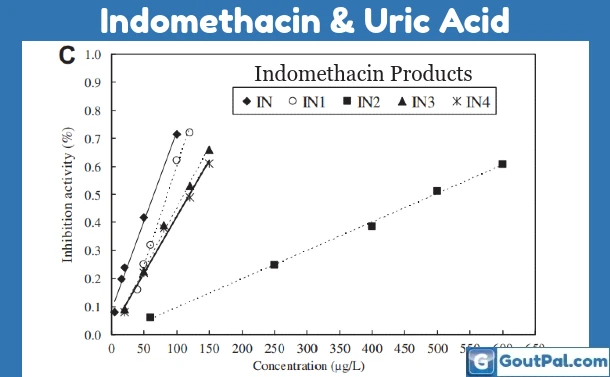Why is indomethacin preferred for gout?
Is indomethacin your first choice for gout pain? Or do you also use it to lower uric acid?

Indomethacin & Uric Acid Introduction
Many gout patients rely on indomethacin to help relieve gout pain and inflammation. Let's see if it can also help with uric acid.Indomethacin & Uric Acid Purpose
I wrote this indomethacin & uric acid article to help GoutPal Patients discuss their gout management plan with their doctor.Why is indomethacin preferred for gout?
My short answer to "Why is indomethacin preferred for gout" used to be "Preferred by whom?" Because I only ever found one study that gave any data about preferences[1]. Although hundreds of other studies claimed that indomethacin was the preferred treatment for gout pain relief. But I never found one that supported the claim with relevant facts. Also, it was never supported by real gout sufferers in my gout forums. Because there are just as many discussions about ibuprofen or naproxen.Indomethacin & Uric Acid
Disappointingly, these are laboratory and computer-modeling studies. So we must wait for some realistic testing on human gout sufferers. Nevertheless, they certainly support indomethacin as the preferred gout pain treatment.Indomethacin as a Xanthine Oxidase Inhibitor
Xanthine Oxidase (XO) is a substance in humans that causes us to convert purines into uric acid. So allopurinol, the first choice of XO inhibitor, works by reducing the amount of uric acid we produce.In 2013, scientists used computer-modeling backed by lab tests to measure the inhibitory effects of naproxen, ibuprofen, diclofenac, indomethacin, and celecoxib on xanthine oxidase. After comparing test results, they conclude:according to our study five most used NSAIDs have been tested for their ability to inhibit xanthine oxidase. All the tested drugs showed important inhibitory effects, especially Indomethacin, which give double beneficial effects in treating gout inflammatory symptoms and inhibit the xanthine oxidase significantly. Depending on these results, we select Indomethacin as effective and proved NSAIDs against gout disease.[2]
Indomethacin as the Best Xanthine Oxidase Inhibitor
Later, scientists compare indomethacin with products derived from it. Because indomethacin will degrade when exposed to light. So they recommend that indomethacinshould not be exposed to light during storage to avoid its photodegradation, because its photoproducts exhibit reduced efficacy.[3]
Indomethacin & Uric Acid Summary
Whether we prefer indomethacin for gout seems to depend on the context. But the latest science suggests that it is a strong candidate for the first choice of gout pain treatment. However, we need to see lab results confirmed by clinical trials. Then we will know if indomethacin can help reduce uric acid in human gout sufferers.
Do you Prefer Indomethacin for Gout?
You have learned that indomethacin is a strong candidate for your first choice of NSAID. But you need to consider this in the context of your current gout management progress. In particular, you must discuss this latest science with your doctor. Because they are best placed to manage your treatment in a way that suits your medical history and personal preferences. Prior to that discussion, I recommend you read and understand:- Be CLEAR about Stopping Gout Pain. Because that helps you understand indomethacin's place in your battle against gout flares.
- Personal Gout Food Research. Because you can apply those principles to any gout treatment - not just food.
Leave Why is indomethacin preferred for gout? to browse the Indomethacin & Gout index.
Indomethacin & Uric Acid Feedback
Please share your thoughts about this page. To discuss other gout concerns, use the feedback link for the most relevant page. But if you just want to chat with other gout sufferers about indomethacin & uric acid, use GoutPal's Gout Discussions.
If you are asking a question, it's best to:
- Search for that question in Google Gout Search Engine first.
- Choose the most relevant result.
- Refer to that result as you ask your question.
Indomethacin & Uric Acid References
- Stuart, R.A., Gow, P.J., Bellamy, N., Campbell, J. and Grigor, R., 1991. A survey of current prescribing practices of antiinflammatory and urate-lowering drugs in gouty arthritis. The New Zealand Medical Journal, 104(908), pp.115-117.
- Lien, G.S., Chen, C.S., Chen, W.Y., Huang, S.H., Cheng, K.T., Lin, C.M. and Chao, S.H., 2013. Photoproducts of indomethacin exhibit decreased hydroxyl radical scavenging and xanthine oxidase inhibition activities. journal of food and drug analysis, 21(3), pp.332-336.
- Bou-Salah, L., Benarous, K., Linani, A., Rabhi, F., Chaib, K., Chine, I., Bensaidane, H. and Yousfi, M., 2021. Anti-inflammatory drugs as new inhibitors to xanthine oxidase: In vitro and in silico approach. Molecular and cellular probes, 58, p.101733.
